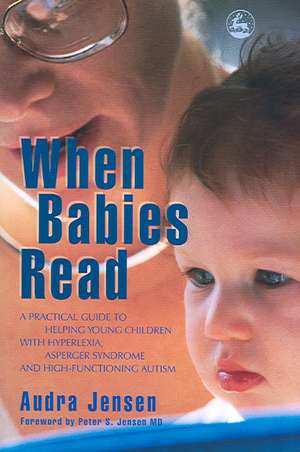When Babies Read: A Practical Guide to Help Young Children with Hyperlexia, Asperger Syndrome and High-Functioning Autism
Autor Audra Jensen Peter S. Jensenen Limba Engleză Paperback – 31 iul 2005
Preț: 120.49 lei
Preț vechi: 145.94 lei
-17% Nou
Puncte Express: 181
Preț estimativ în valută:
23.06€ • 24.14$ • 19.08£
23.06€ • 24.14$ • 19.08£
Carte indisponibilă temporar
Doresc să fiu notificat când acest titlu va fi disponibil:
Se trimite...
Preluare comenzi: 021 569.72.76
Specificații
ISBN-13: 9781843108030
ISBN-10: 1843108038
Pagini: 189
Ilustrații: Illustrations
Dimensiuni: 150 x 228 x 12 mm
Greutate: 0.3 kg
Ediția:American Paperb.
Editura: Jessica Kingsley Publishers Ltd
ISBN-10: 1843108038
Pagini: 189
Ilustrații: Illustrations
Dimensiuni: 150 x 228 x 12 mm
Greutate: 0.3 kg
Ediția:American Paperb.
Editura: Jessica Kingsley Publishers Ltd
Notă biografică
Audra Jensen is mother to a son with autism and hyperlexia, and to a typical, bright, and energetic daughter. She lives near Seattle with her husband and family. Audra K. Jensen's background is in technical writing and graphic design. She is now undertaking a Master's degree in Early Childhood Special Education and plans to become a hyperlexia researcher and an autism specialist for the schools. She has been actively involved in the autism community and hopes to continue to educate parents and professionals on hyperlexia and its challenges and blessings.
Cuprins
Foreword. Preface. Acknowledgements. 1. Something About Him. 2. The Walking Paradox. Definitions. Why Does Hyperlexia Fit? Diagram of Hyperlexia. To Diagnose or Not to Diagnose? That is the question. 3. The Case for Teaching Reading. Create a Hyperlexic? Early Brain Development. Making the Case. Teaching Guidelines. What Method? 4. Teaching Babies to Read. Preparation. Level One: Match Word. Level Two: Pointing. Level Three: Match Object. Level Four: Reading. Level Five: Generalization. The Genelect Program. Set One: Familiar names and high-frequency words. Set Two: Facilitating Words. Set Three: First letters. Set Four: First Phonic Words ă (CVC). Set Five: Common high-frequency words. Set Six: Individual interest words. Set Seven: More phonics words Ä• Ä Å Å (CVC). Set Eight: Phonics vowel change (CVC). Set Nine: More high-frequency words. Set Ten: Phonics long vowel (CVC-e). Set Eleven: Phonics blends. Set Twelve: More long vowels. Phonemic Conventions. Sight and High-frequency Words. 5. Line of Attack. Home. Outside Therapies. School. Other Environments. Strategies. 6. Learning Early Social Expectations. Reminder Book. Situation Book. Incentive Chart.. 7. Navigating the School System Placement. When You Have to Fight. Process Guidelines. 8. Customizing Behavior Therapy. Pro-Active Responses. Foundation Skills. Social Skills. Academic Skills. 9. Customizing Language Therapy. Receptive Language. Expressive Language. Wh- Questions. Intraverbals. Grammar. Social Language. 10. Theory of Mind. Picture Inferencing. What Comes Next? Guess/Don't Guess. Verbal Inferencing. Thought Bubbles. Role Playing with Figures. 11. Ten Commandments. Appendix A: Special Education La in the United States. Special Education Law Terms. The Special Education Process. Legal Documentation. Appendix B: Some Useful Organizations in the UK. Appendix C: Glossary and Diagnostic Criteria. Glossary. DSM-IV (1994) Diagnostic Criteria. Other Disorders. References. Index.
